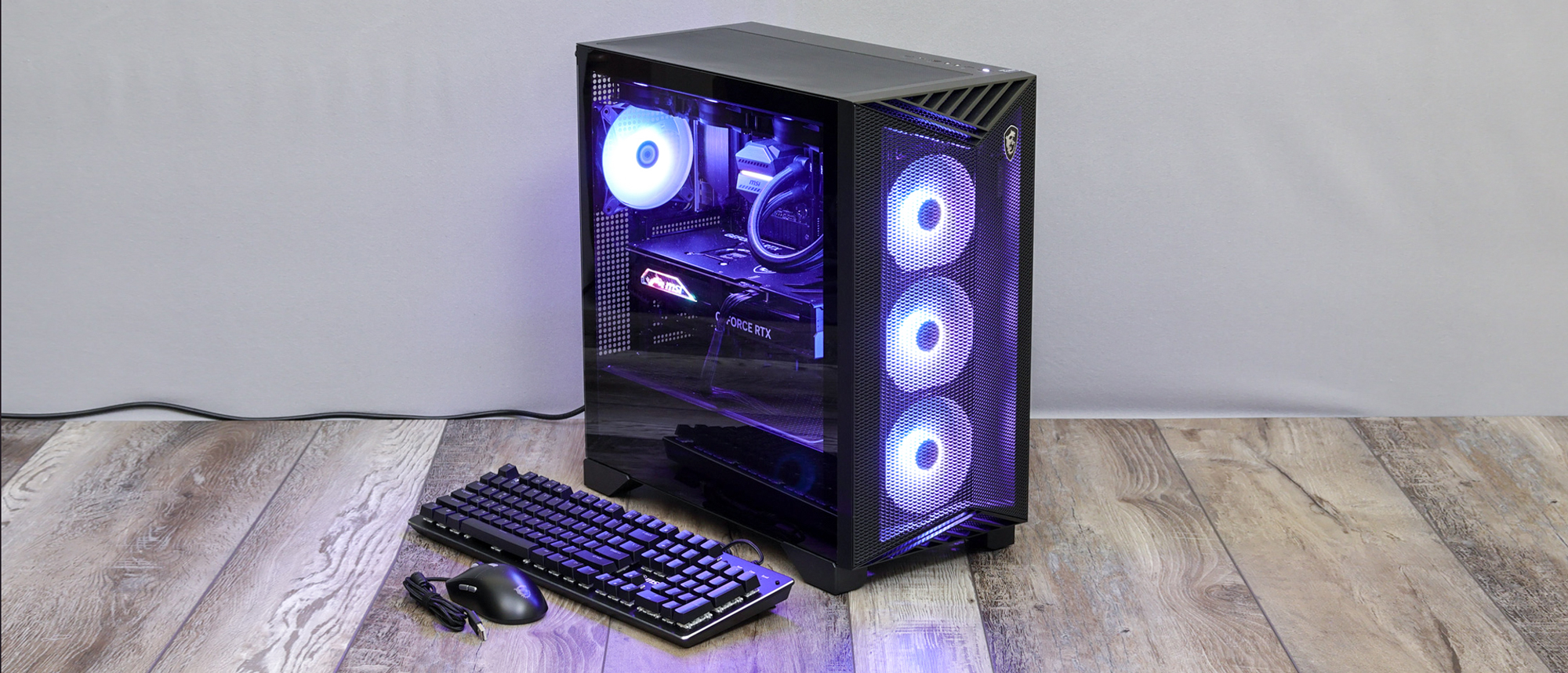Tom's Guide Verdict
This off-the-shelf gaming PC gives you all the performance of premium systems at an even more affordable price. While the lack of storage and lackluster USB ports are disappointing, you'd be hard-pressed to get better performance at this price.
Pros
- +
Great build quality
- +
Many configurations and prices
- +
Wi-Fi 7 support
- +
Includes mouse and keyboard
Cons
- -
All configs not available at all vendors
- -
No secondary storage offered
- -
Lackluster USB ports
Why you can trust Tom's Guide
The MSI Aegis R2 ($1,899 to start) is an off-the-shelf gaming PC that competes with the best of the boutique builders, and it delivers good value and great build quality for the price.
Of its five desktop product lines, MSI's Aegis is the widest ranging as it covers everything from upper mainstream systems to just under the ultra-premium configurations reserved for the Infinite line. The new RS2 variants mix liquid cooling with Intel's 14th-generation CPUs, a Z790 motherboard, Wi-Fi 7 and Nvidia 4000 series GPUs.
These desktops offer high performance for a price that doesn't require a third mortgage to afford. In this MSI Aegis RS2 review, I'll walk you through what you get and with these prebuilt PCs and why they're competitive with the best gaming PCs on the market.
MSI Aegis RS2 review: Price & availability
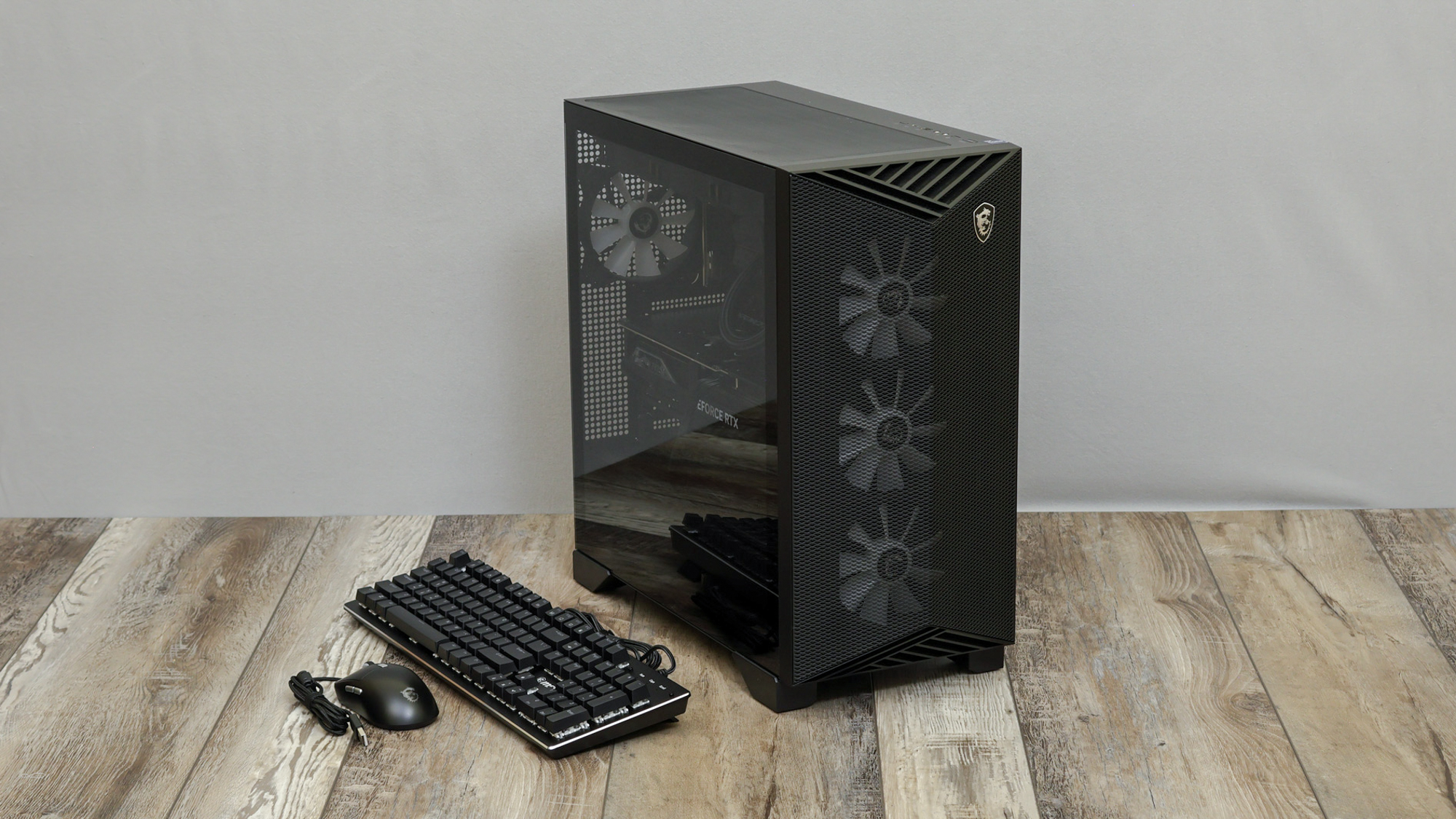
The Aegis isn't a custom (or even semi-custom) desktop in that you can't order a specific configuration from MSI.
However, MSI offers many pre-built SKUs for sale on its website in a broad range of configurations and price points. Lower end models have air-cooled CPUs (i7-14700KF or Ryzen 7700), RTX 4060 graphics, 16GB DDR5, and 1TB NVMe storage drives and cost upwards of $1,800.
The higher-tier SKUs run up to $3,000 and use i9 and Ryzen 9 CPUs, 360mm liquid-coolers, RTX 4080 Super graphics, 64GB DDR5 memory, and 2TB NVMe drives.
These Aegis desktops are also available for purchase from retailers such as Newegg, Best Buy, B&H, Walmart, and others.
The Aegis R2 review unit MSI sent us for this review includes an Intel Core i9-14900KF CPU in a Z790 motherboard, an Nvidia RTX 4080 Super GPU, 32GB RAM, plus a 2TB NVMe drive and has an MSRP of $2699.
MSI Aegis RS2 review: Design
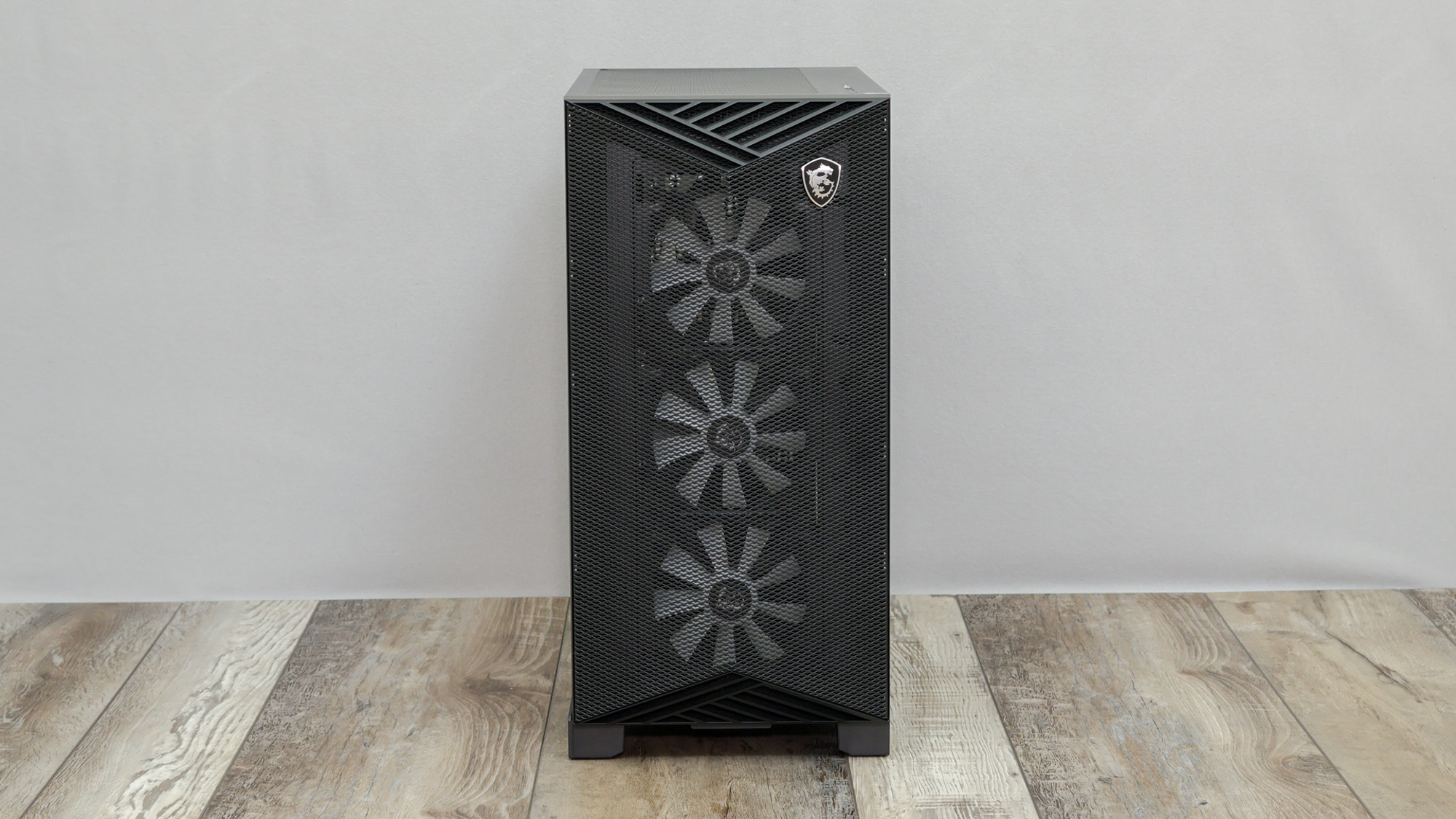
The defining feature of the Aegis RS2 case is the front panel, with its protruding, angular faces, and lone MSI dragon logo. The base design has a tempered glass panel on the left side with vented mesh on the top, right, and bottom and is available in either a white or black case. Two alternate versions are available with the black case which omits the glass and uses a different mesh design. Three RGB fans are stacked in the front for air intake and no front drive bays are available.
The main side panel is tempered glass to show off the internals. At the base of the Aegis (at least, this particular configuration) is the MSI PRO Z790-VC WIFI motherboard. The beefy i9-14900KF CPU is cooled by a 360mm radiator mounted at the top of the case. Twin sticks of 16GB DDR5-5600 RAM are used for 32GB total system memory. Below the CPU, under its own heatsink, is a 2TB M480 NVMe drive providing plenty of storage for games and applications.
The central showpiece is the Nvidia GPU, a triple-slot RTX 4080 SUPER. The GPU is mounted with a support bracket to prevent sagging and physical damage to the card. The GPU also sports RGB lighting around the MSI logo on the top edge. The PSU is bottom mounted and covered with a shroud to hide it and most of the cables from view.
The backside panel is vented at the front and bottom for additional airflow if necessary. Remove the panel (both left and right panels use captive thumb screws) and you see the central fan and RGB controller and cables neatly bundled. The top panel is fully vented and allows mounting for both 120mm and 140mm fans or radiators. A dust filter is magnetically attached up top and more are on the bottom to protect the PSU's air intake.
MSI also bundles a keyboard and mouse with all their desktops, something many custom and boutique models charge extra for, or don't offer. The top row F keys are doubled up with usual shortcut functions, but the keyboard has no dedicated media, gaming, or shortcut keys. The keyboard uses membrane switches, though with mechanical switch cues, making it a hybrid design. Though not as crisp as a true mechanical keyboard, it's certainly a step or two better than most bundled keyboards from Dell or HP. The keyboard has colored row backlighting. A key combo shortcut cycles through different lighting patterns, but there's no per-key RGB lighting.
Like the keyboard, the mouse is quite a bit better than most bundled desktop mice. It has a large, full size meant to fill out your hand, not just sit flat and look nice on a desk. It has five buttons, including a Back and Forward thumb button and clickable scroll wheel, plus a dedicated DPI shift button up top. Like the keyboard, the mouse has cycling lighting patterns, but it's not programmable.
MSI Aegis RS2 review: Ports & upgradability
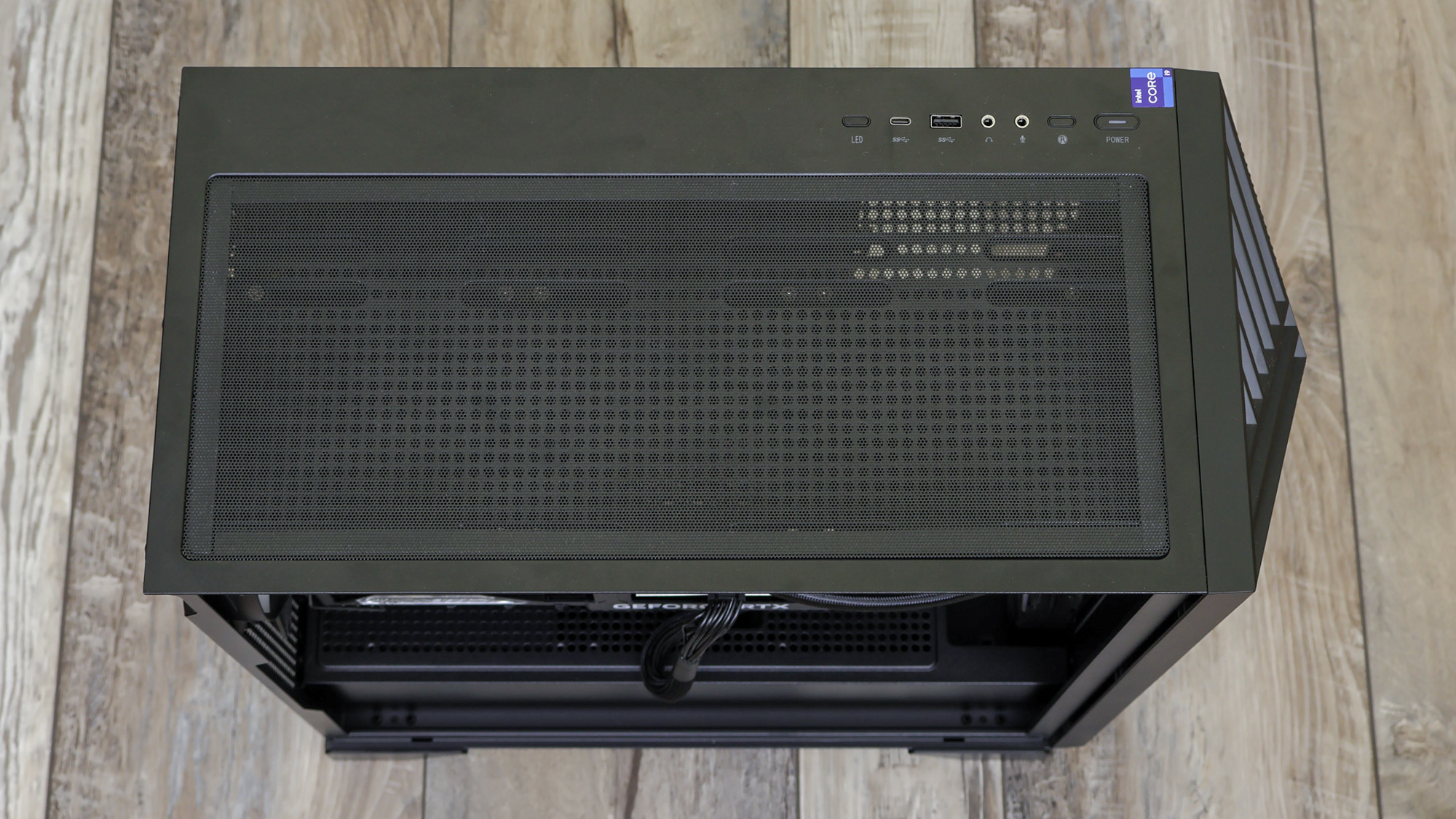
The power and reset buttons are along the right edge of the top panel. With them is also an LED button which cycles the RGB lighting of the fans and CPU waterblock through various colors and patterns (the GPU lighting isn't synced, though). Two 5 Gbps USB ports – one type-A, one type-C – are also up top along with 3.5mm audio jacks for headphones and a mic.
A total of seven USB ports are on the rear I/O: two 2.0, four 5Gbps 3.0, and one 20 Gbps type-C. One PS/2 port is available if you have a keyboard that needs it. The audio out includes six 3.5mm jacks, but no fiber optic connection. Two antenna connections are for the integrated Wi-Fi controller on the motherboard which supports the new 802.11 be Wi-Fi 7 protocol.
However, the offered USB ports leave something to be desired on a PC costing over $2,500. Only one port has bandwidth over 5Gbps, and only two ports are on the front for quick access. That's not terribly helpful for those using high-speed external storage, or that need to frequently (dis)connect portable drives.
As our review model has a KF processor with no integrated graphics, the HDMI and DisplayPort connections are covered with a sticker, reminding the user they are effectively disabled. It's also important to note that other Aegis configurations may use a different motherboard, which would change the available ports.
As the Aegis uses a standard case and parts, consumers can change and upgrade components as they wish. Users that want to expand storage capacity beyond the single NVMe drive have multiple 3.5" and 2.5" bays available in the case.
MSI Aegis RS2 review: Gaming performance
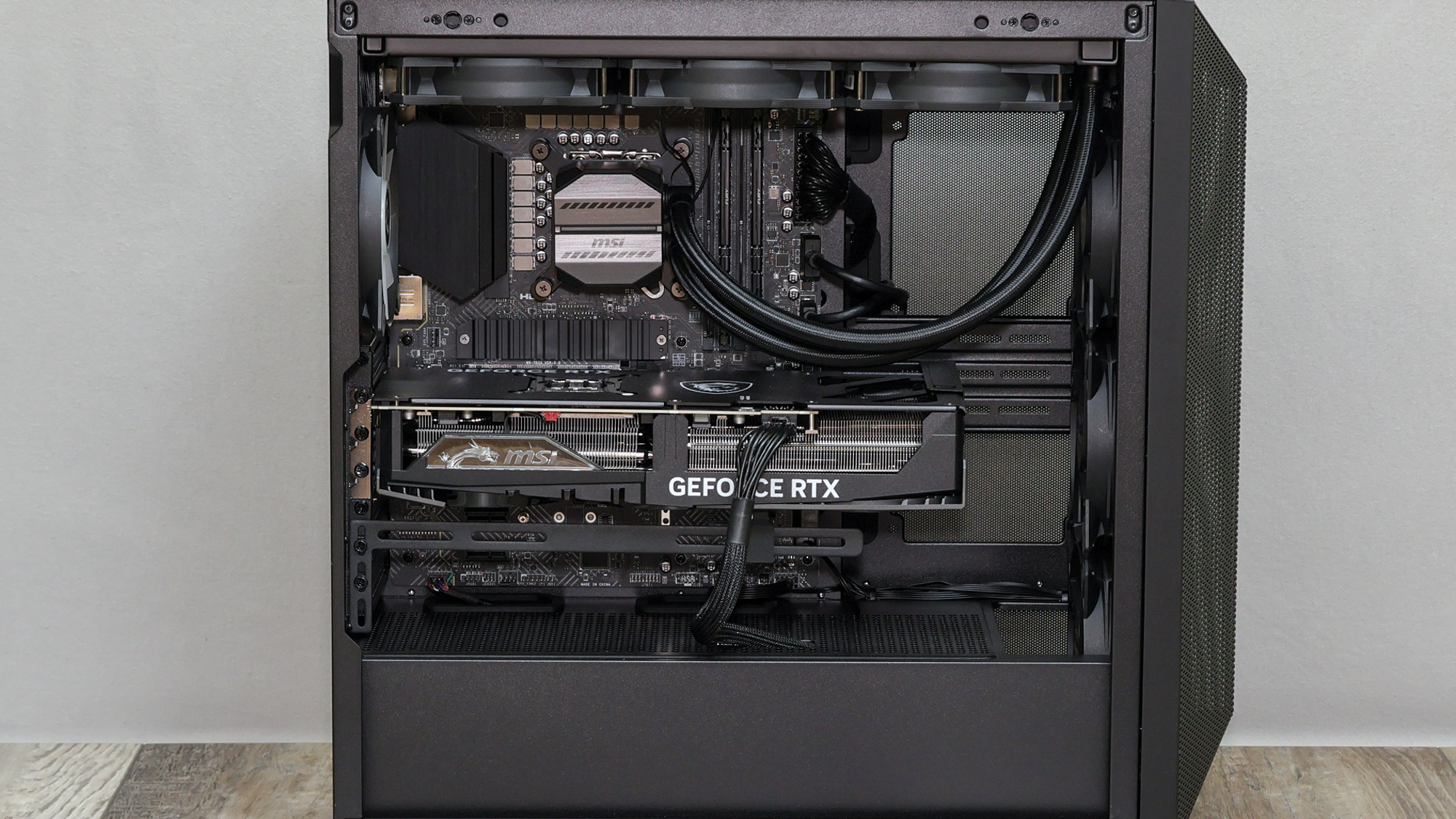
We expect the Aegis to perform admirably in our 4K gaming benchmarks given that it costs nearly $3,000. We've seen many desktops recently come across our review bench using 14th-gen i9 processors and 4080 or 4090 GPUs, so we have a good idea what to expect.
Last year's Origin Chronos V3 should be a useful comparison as it's nearly identically equipped, albeit with last-gen parts. The Chronos has a i9-13900K processor instead of the newer i9-14900KF and both use a 360mm radiator for cooling. The Chronos uses an RTX 4080 instead of the overclocked 4080 Super in the Aegis. On the other side we can use the more recent Corsair Vengeance i7500, using the came i9-14900K CPU but much more powerful RTX 4090.
| Row 0 - Cell 0 | Borderlands 3 | Cyberpunk 2077 | GTA V |
| MSI Aegis RS2 | 90.9 | 29.1 | 60.7 |
| Origin Chronos V3 | 88.1 | DNR | 56.2 |
| Corsair Vengeance i7500 | 129.81 | 42.67 | 86.8 |
As expected, the Aegis has only a small lead over the Chronos in gaming performance.
Focusing on 4K resolutions, we see the Aegis is only 3fps faster (or less) than the Chronos in Borderlands 3, Far Cry 6, Shadow of the Tomb Raider, and even more demanding titles like Metro Exodus Enhanced Edition and Red Dead Redemption 2. The exceptions to this are DiRT 5 and Grand Theft Auto V. In DiRT, going from 127fps to 135fps isn't really meaningful. In GTAV, though, it's enough to bump performance over the 60fps mark for truly smooth gameplay without needing a VRR display, so that may be important for some users.
On the other end, the Vengeance enjoys a significant performance advantage over the Aegis thanks to the monstrous RTX 4090. As you can see from our test results, framerates are 25% to 50% faster across the board.
However it's important to note the Aegis is an off-the-shelf retail system, not a custom or boutique build. It's significantly less expensive than either the Chronos or Vengeance. Even a similarly equipped Vengeance with RTX 4080 Super is hundreds of dollars more expensive.
The Aegis is also easy to live with thanks to its quintet of cooling fans. Using a 360mm radiator for the CPU and four additional case fans gives it plenty of cooling. Though it may seem counterintuitive to some, having more fans actually allows a system to run quieter. Seven fans at half speed are often quieter than four fans at full speed, and they move more air. Even under full 4K gaming load, the system is under 36 dBA from 1m away. Maximum gaming power draw stays around 415W, though you can certainly send it much higher with synthetic stress tests.
MSI Aegis RS2 review: Overall performance
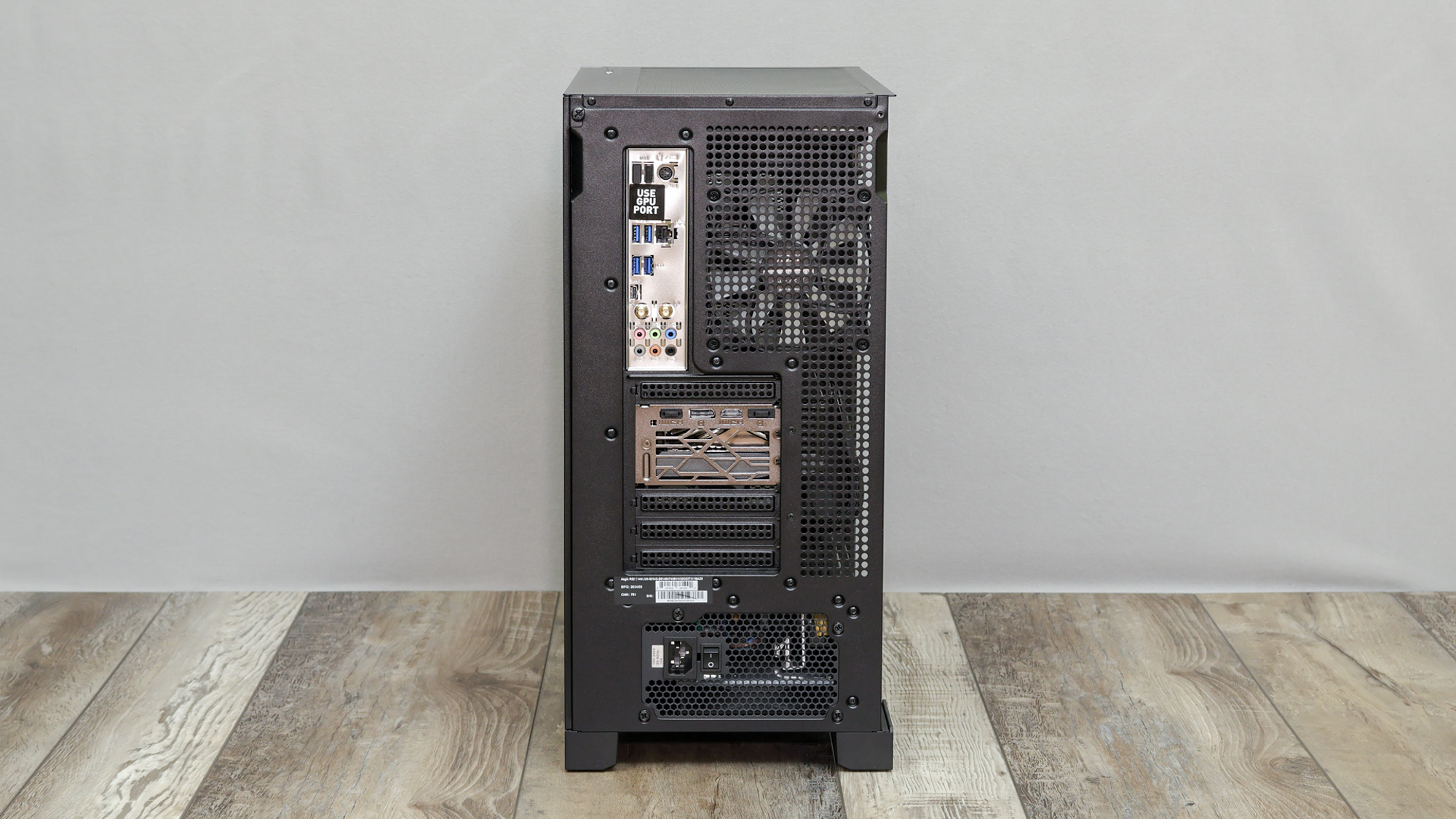
The eight hyper-threaded performance cores in the i9-14900KF can boost up to 6.0 GHz while 16 efficiency cores at 4.4 GHz offer lots of processing bandwidth. These 32 execution threads, backed by 32 GB of system RAM and 2TB of NVMe storage make for a system that can work just as well as it can play.
| Row 0 - Cell 0 | Geekbench 6 single-core | Geekbench 6 multi-core | SSD speed test |
| MSI Aegis RS2 | 3,203 | 20,115 | 2,002.5 |
| Origin Chronos V3 | 2,170 | 23,925 | 1,809.5 |
| Corsair Vengeance i7500 | 2,225 | 25,517 | 1,774.4 |
In the Geekbench 6 multi-core CPU test our review unit scored 20,115, while the machine learning tests marked 4977 on the CPU and 25989 on the GPU. The Crossmark scores, which simulate creative and productivity tasks, are similarly high. The Aegis falls a little shy of the Vengeance, but that machine also had twice the RAM.
Our Handbrake video conversion test only took 2:04 to complete on the Aegis, which is a few seconds faster than the Vengeance. But in practical use, this is essentially a tie.
In storage, the Aegis transferred our 25 GB test file in an incredible 13.41 seconds for an average of 2002.56 MBps. This is faster than even the Vengeance at 1774.47 MBps. However, like the Vengeance, the Aegis is not offered with a secondary spindle drive for mass storage. While the case has room for additional drives for the consumer to add one, it would be nice to have that option out of the box.
MSI Aegis RS2 review: Software & extras
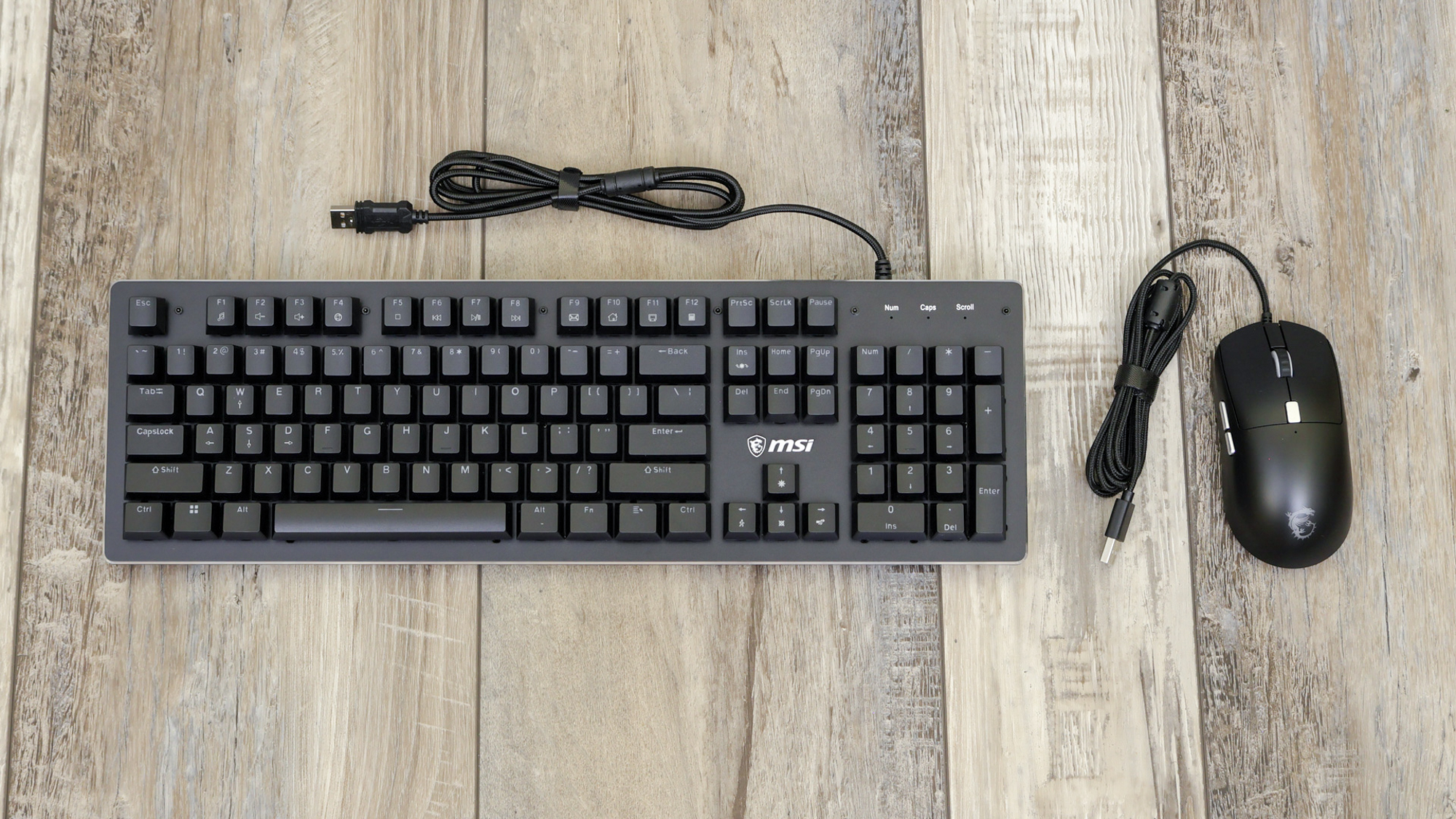
MSI keeps software to a minimum, something we appreciate. The MSI Center app has modules allowing you to customize your system, performance profiles, and RGB lighting. It also can be used to monitor system status, clock speeds, temperatures, and other more. A trial of Norton Antivirus is also included.
Also, the PC comes with a wired mouse and keyboard included at no extra charge. They're nothing to write home about, but it's nice to get them so you don't need to worry about providing your own.
MSI Aegis RS2 review: Verdict
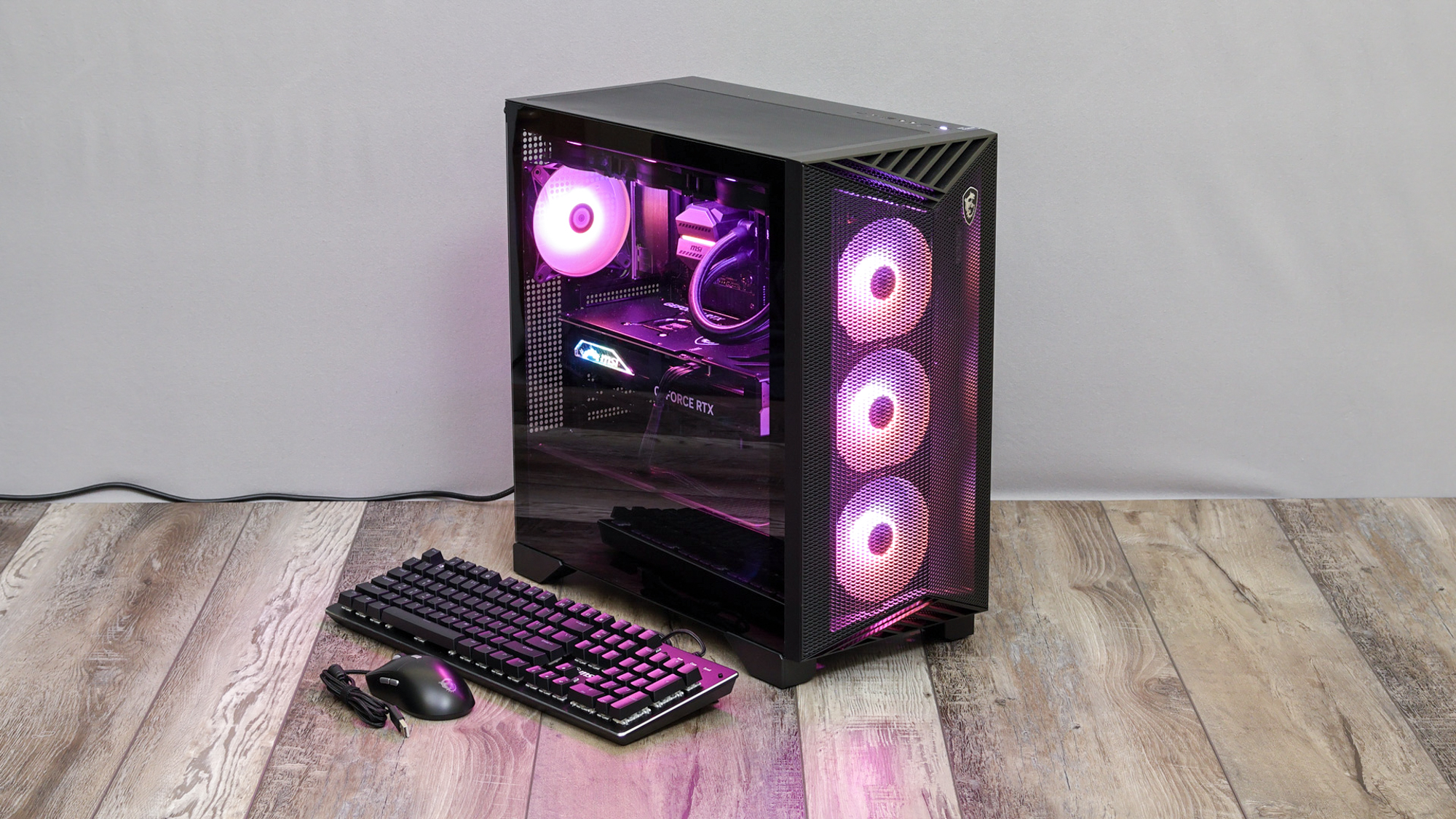
A $2,700 PC is certainly not "low-budget." But as I noted when reviewing the Corsair Vengeance, "value" for high-end gaming PCs is calculated differently. That said, since it's priced a couple hundred less than some similarly configured gaming PCs the Aegis increases the traditional value viewpoint considerably.
The Aegis has quality construction and the cable management is very clean. The end customer isn't locked into any proprietary cases or parts so future customization and upgrades are no problem at all. The included keyboard and mouse are much better than the typical trashcan filler you get with home/office desktops. They don't match up to the quality of the best mechanical keyboards or programmable mouse, but they're quite competent.
It also comes with a carry bag that makes it easy to remove the PC from its shipping box or repack it back in with ease, which is an underappreciated feature.
And while you can't custom-order the components, MSI offers many versions of the Aegis at such a broad range of prices that you'd be hard-pressed to not find exactly what you wanted. However again, the lack of custom ordering means you're limited to what's in stock at your retailer of choice. And regardless of where you get it, a secondary storage drive is never an option.
For a machine that comes with all this, offers a stellar 1440p gaming experience, and noteworthy 4K60 gaming performance, a price tag of $2,700 is more than reasonable. Finding it as low as $2,400 isn't unheard of if you keep an eye out for sales and clearance events, either!
Eric started gaming young in life, crashing MS Flight Simulator planes at the age of three on a suped-up PCjr in the Microsoft test labs. Much of high school was spent in the computer labs, building computers from spare parts, writing programs on his TI calculator to do his physics and calculus homework, and helping the business teacher run multiplayer StarCraft games on the school network. Eric has over 15 years’ experience in databases, programming, quality assurance, and testing methodology. He has reviewed tech and computer hardware since 2015 for Tom’s Hardware and other outlets.
